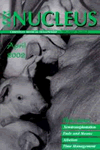Since the shift from modernism to post-modernism, society no longer recognises absolutes. It dismisses anything that claims to be a 'sure and solid foundation' on which to build one's life. It prefers instead to cast itself adrift, with no anchors or even a compass to guide its movement. While this change may appear exciting and forward thinking, it has been associated with an enormous rise in levels of anxiety and stress found in the population; we have become 'the Prozac generation'.
Many students have suffered depression and anxiety; tragically some have even committed suicide. A recent study among medical students at the University of Leeds 1 showed 41.2% of the students had anxiety ratings within the clinically significant range (HAD scale > 8); 9.5% demonstrated clinically significant levels of depression.
Christians are by no means immune from anxiety or depression; in reality our beliefs often complicate them. We may be tempted to think that feeling anxious is a sin; this can be further compounded by the idea that we are never serving God enough. Similarly, if we feel depressed, are we being ungrateful for all that God has done? As Christians, the focus of our lives is in stark conflict with the world around us; this alone can be a distressing experience. Luke's gospel gives an account of how Jesus wept over the sin of Jerusalem (Lk 19:41). Yet when he later wept on the Mount of Olives over his impending death, he drew strength from knowing it was God's will and that God had given him the strength to carry it through (Lk 22:42-44). This is a good example for us to follow.
We should not however be naive; God gave us brains to use. Some of the greatest worries facing students are the heavy workload, and looming deadlines of coursework and exams. In this issue of Nucleus, Malcolm Savage tackles the skill of managing our time and avoiding the associated stress. Ruth Selwood, a former editor of Nucleus, compares the beliefs of atheism to the steadfast claims of Christianity in our series on reaching those of other faiths.
Reference
- Pickard M, Bates L, Dorian M. Alcohol and drug use in second-year medical students at the University of Leeds. Medical Education 2000;34(2):148-50
































